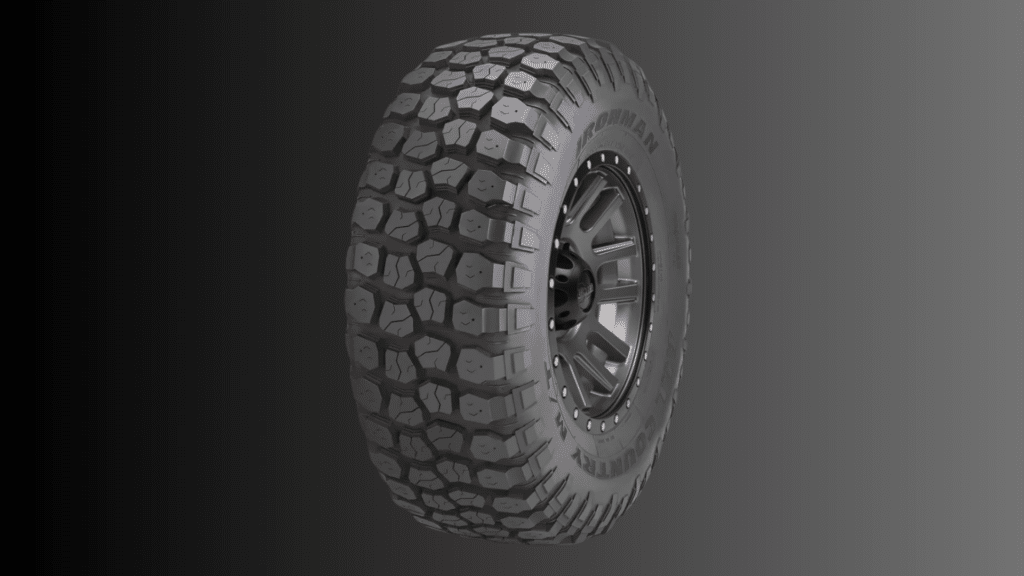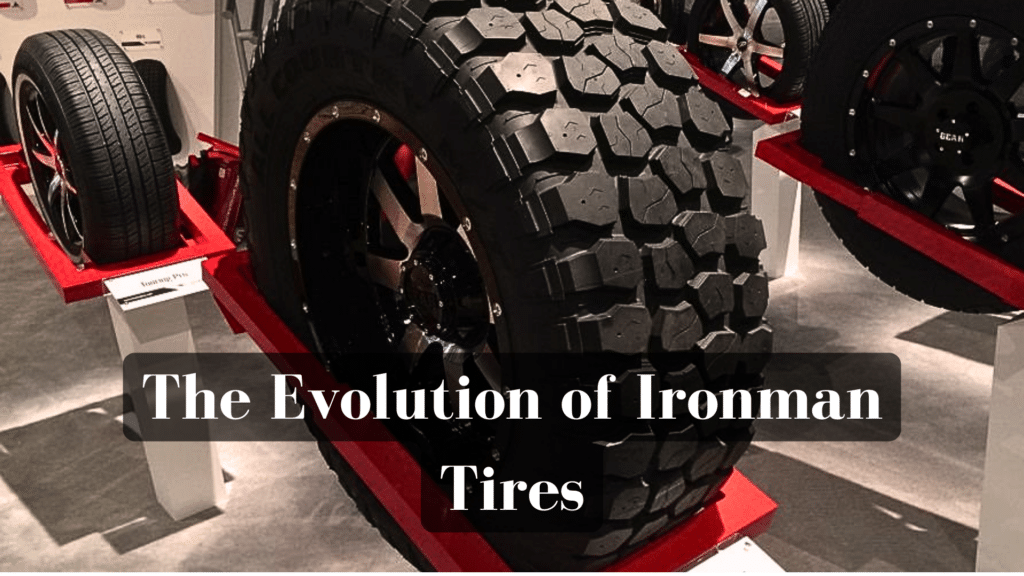Ironman Tires has come a long way since its early days.
They started with a simple goal: to make solid tires at a fair price.
This aim has earned them a loyal crowd among car fans. Many like them because they’re reliable and won’t break the bank.
Here, I’ll cover their main features and real-world performance.
I’ll also show you what makes them stand out from other budget choices so you can make a confident decision.
Here’s what you’ll find:
- Straight talk on what Ironman Tires do well
- Honest thoughts on their weak points
- Practical tips for getting the most out of them
I’ll build trust by sharing personal insights and facts.
If you’re thinking about new tires, stick around. I’ll help you solve that concern once and for all.
Key Features of Ironman Tires

I want to share what makes these tires stand out.
I’ve had them on my car for months now, and I’ve seen how they work in daily life.
If you’re looking for simple facts, you’re in the right place.
Tread Design and Material Quality
Their tread design grips the road well. It’s not fancy, but it’s solid.
The rubber material feels sturdy. It helps with traction on dry roads.
It also adds grip on wet surfaces, which I appreciate.
Durability in Various Road Conditions
I’ve driven on highways, side streets, and even a few gravel paths.
The tires still look good. They’re made to handle normal wear.
They also hold a decent grip in light rain. If you drive carefully, they should last a long time.
Noise Level and Ride Comfort
These tires are mostly quiet.
Even at higher speeds, I don’t hear much road noise.
Some budget tires can be loud, but these are manageable.
The ride feels stable, and bumps don’t send huge shocks through the cabin.
Performance Review of Ironman Tires
I’ve tested these tires in different weather conditions. Let’s break down how they perform.
Handling Under Different Weather Conditions
On dry roads, they feel responsive.
Steering is direct, and I don’t sense much slip.
In wet conditions, they grip well enough for normal driving.
I never felt out of control. Light snow is trickier.
The tires can handle mild winter dustings, but deep snow might be too much.
You may need a dedicated snow tire if you live somewhere with harsh winters.
Road Grip and Stability at Varying Speeds
I’ve driven at slow speeds around town, as well as on highways at higher speeds.
At lower speeds, the tires hug the road with minimal noise.
At highway speeds, they remain stable and steady.
I noticed a slight vibration on older pavement but nothing major.
Overall Driving Experience From a User Standpoint
These tires are friendly and easy to use, predictable, and don’t scream on rough roads.
I trust them to get me where I’m going without fuss.
If you want a simple, capable set of tires, these might suit you.
Advantages of Choosing Ironman Tires
I know picking tires can feel like a big deal. With so many options, it’s easy to second-guess yourself.
That’s why I want to share some clear points about Ironman Tires.
1. Highly Economical
If you have a tight budget, that’s a big plus.
You still get a solid product without breaking the bank.
2. Wide Range of Choices
Ironman Tires come in various sizes for different vehicles.
It works if you drive a sedan or an SUV, so there’s likely a match for you.
I’ve found them at local shops and online retailers, making them easy to get.
3. Warranty and Support
If something unexpected happens, you’re not on your own.
The company usually backs its products with a warranty.
Check the terms, but knowing you have some protection if a tire fails early is comforting.
Limitations of Ironman Tires
No tire is perfect.
I’ve noticed a few things about Ironman Tires that might matter to you.
1. No match to the premium brands
While Ironman Tires are great for the price, they might lack some features found in higher-end tires.
For example, the handling in extreme conditions isn’t as sharp.
If you’re looking for top-notch performance, you might find them a bit basic.
2. Treadwear and noise can be issues over time
After several months, the tread wore down faster than I expected.
This can affect grip and safety.
Also, as the tires age, they become noisier.
You might hear more road sounds, which can be distracting on long drives.
3. Some drivers have raised concerns
A few people mentioned that the tires lose pressure quickly, and others said the ride isn’t as smooth on very rough roads.
These issues might not be deal-breakers, but they’re worth considering.
These limitations don’t overshadow the benefits, but it’s important to know them.
You might need to look elsewhere if you need the best performance and longevity.
However, for everyday use, Ironman Tires still offer good value.
Ironman Tires Compatibility with Different Vehicles
Choosing the right tires is key for your vehicle.
I’ve found that Ironman Tires work well with several types of cars. Let me share what you need to know.
Types of Vehicles That Typically Match Well
Ironman Tires fit a variety of vehicles:
- Sedans: Smooth and efficient for everyday driving.
- SUVs: Good grip for both city streets and light off-road.
- Trucks: Durable enough for heavier loads and rougher roads.
Factors to Consider When Selecting the Right Ironman Model
Not all tires are the same. Here’s what to think about:
- Size: Make sure the tire size matches your vehicle’s requirements.
- Driving Needs: Choose a model based on whether you drive mostly on highways, city roads, or rough paths.
- Weather Conditions: Select tires that handle the climate where you live, like wet or dry conditions.
Tips for Ensuring Proper Fit
Proper fit is crucial for safety and performance. Here are some tips:
- Check the Manual: Your car’s manual has the recommended tire sizes.
- Consult a Professional: A tire specialist can help you pick the right model.
- Use Online Tools: Many websites let you enter your vehicle details to find compatible tires.
Comparing Ironman Tires to Competitors
When choosing tires, it helps to compare Ironman to others.
I’ve compared similar budget brands to give you a clear picture.
Ironman Tires have their strengths and weaknesses compared to other budget options:
Pros And Cons Of Ironman Tires
- Pros:
- Better Durability: They tend to last longer than some competitors.
- Quiet Ride: Less road noise compared to similar-priced brands.
- Affordable Prices: Often priced lower without sacrificing quality.
- Cons:
- Limited Advanced Features: Fewer high-tech options than some rivals.
- Basic Design: Less stylish tread patterns compared to others.
Main Differences in Pricing and Performance
Price-wise, Ironman Tires are usually cheaper.
You get good performance for the money.
Some competitors might offer slightly better performance but at a higher cost.
Here’s a quick comparison:
- Ironman Tires: Lower price, solid all-around performance.
- Brand A: Higher price, better grip in extreme conditions.
- Brand B: Similar price, more variety in models.
Key Insights on Quality and User Satisfaction
Users generally appreciate Ironman Tires for their reliability and value.
Many say they feel confident on the road without spending too much.
However, some prefer other brands for specific needs, such as high-speed driving or unique vehicle types.
Tips for Maintaining and Maximizing the Life of Ironman Tires
Keeping your Ironman Tires in good shape is easier than you think.
I’ve learned a few simple steps to help you get the most out of them. Here’s how you can take care of your tires:
1. Regular Rotations and Balancing
Rotating your tires regularly is key. It helps them wear evenly.
I usually rotate mine every 5,000 miles.
Balancing is also important. It prevents vibrations and uneven wear.
You can do this at most tire shops.
2. Checking Tire Pressure and Alignment
Keep an eye on your tire pressure. Under or over-inflated tires wear out faster.
Check the pressure once a month.
Also, make sure your wheels are aligned.
Misalignment can cause your tires to wear unevenly and affect your car’s handling.
3. Recognizing Signs of Wear Early
Look for signs that your tires need attention. Here are some things to watch for:
- Tread Wear: If the tread is low, it’s time to replace the tires.
- Cracks or Bulges: These can be signs of damage.
- Vibrations: Feeling unusual vibrations can indicate a problem.
Pro Tips:
- Drive Smoothly: Avoid sudden stops and sharp turns.
- Avoid Potholes: They can damage your tires.
- Store Properly: If you change tires seasonally, store them in a cool, dry place.
By following these tips, you can extend the life of your Ironman Tires.
I’ve seen a big difference in their performance by taking these simple steps.
Take care of your tires, and they’ll take care of you on the road.
Conclusion
After using Ironman Tires, I think they’re a good investment.
They offer reliable quality without costing too much.
Ironman Tires could be a great choice if you balance cost and quality.
Why Choose Ironman Tires:
- Affordable: Save money while getting solid performance
- Reliable: Dependable for everyday driving
- Versatile: Fits many types of vehicles
Choosing the right tires is important.
I encourage you to share your experiences or ask any questions.
Let’s help each other make the best choices for our cars. Your feedback can also help others who are deciding.
Ironman Tires provides good value and dependable performance.
They might be the right fit for your driving needs.
Frequently Asked Questions
Are Ironman Tires Suitable for All Seasons?
Ironman offers all-season tires that perform well in various weather conditions, including dry, wet, and light snowy environments.
Where Can I Purchase Ironman Tires?
Ironman Tires can be purchased at major tire retailers, automotive stores, and online through their official website or authorized sellers.
Do Ironman Tires Improve Fuel Efficiency?
Ironman Tires are designed to provide good fuel efficiency by reducing rolling resistance, which can help save on gas over time.

